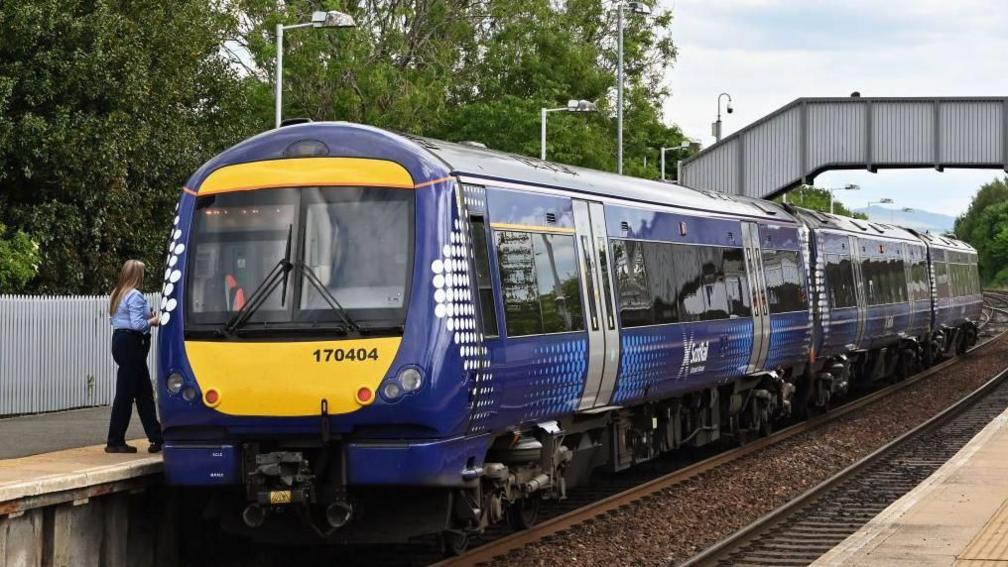ScotRail's full timetable to return next Monday

- Published
ScotRail will be restoring its full timetable from Monday 7 October.
Trains have been running on a reduced timetable since 10 July following a long-running pay dispute involving train drivers.
But last week 75% of Aslef members voted for a new deal, which will provide staff with a 4.5% rise backdated to April.
Peak time rail fares returned to train services in Scotland on 27 September.
Mark Ilderton, ScotRail's service delivery director, said: "We are delighted to confirm that our full timetable will return on Monday.
"We have been working round the clock to deliver this in a very short space of time because we know how important a full service is to our customers.
"It’s been a difficult few months for our customers and staff, and we thank everybody for their patience."
Peak fares return to train services in Scotland
- Published30 September 2024
ScotRail drivers accept deal to end long-running pay dispute
- Published25 September 2024
He added: "With a pay deal agreed and the full timetable back in place, everyone at ScotRail is focused on delivering a safe, reliable, and green service for our customers."
The company said it was recruiting 160 new drivers every year to reduce its reliance on overtime working.
Trade unions and environmental groups have launched a petition demanding the permanent abolition of peak fare pricing.
The Scottish government had introduced the pilot scheme to encourage people to use the railway rather than their cars, but said it could not justify continuing it as passenger levels had not increased to the levels hoped for.
Transport Secretary Fiona Hyslop said while there had been an increase in passenger levels of about 6.8% during the pilot, it would have required a 10% jump in order for the policy to become self-financing.
The petition is led by the Scottish Trades Union Congress (STUC) and includes a number of unions and environmental organisations.
They argue that return of peak fares contradicts Scotland’s ambitions for sustainable travel and investment in public services.
'Unfair fare structure'
STUC deputy general secretary Dave Moxham said: "Reintroducing peak fares is a slap in the face for working people across Scotland who depend on affordable public transport to get to work.
"This decision blatantly contradicts the government’s own commitments to reducing carbon emissions and creating a fairer society.
"If we are serious about tackling the climate crisis and supporting workers, the Scottish government must end this outdated and unfair fare structure."
He added that scrapping peak fares permanently was essential for a just and sustainable future.
Imogen Dow, Friends of the Earth Scotland's head of campaigns said: "Transport is Scotland’s biggest source of climate pollution so if ministers are serious about getting our climate commitments back on track that means changing the ways we travel.
“We urgently need to move as many journeys as possible from cars to sustainable transport.
"Making sure our public transport is affordable, accessible and reliable is essential to addressing climate change as well as tackling toxic air pollution from traffic."

The emergency timetable at Scotrail highlighted the company’s ongoing dependence on overtime by drivers.
A withdrawal of overtime amid a pay row led to a high number of last minute cancellations – even though there was no actual industrial action by unions.
There was no official overtime ban. Drivers simply said they could not do overtime. They are contractually allowed to do this as overtime at the company is entirely voluntary.
Scotrail argues a dependence on overtime is a long-term issue across the rail industry which it wants to put right.
It says it has recruited 250 new drivers since it was brought back into public ownership in April 2022. It continues to recruit 160 a year.
Their training takes about 18 months and, inevitably, some drivers replace others who have left.
Substantially reducing the company’s dependence on overtime will not be a quick process.
But if the company wants to ensure that informal overtime bans do not lead to widespread disruption again, it will need to ensure it has more drivers.